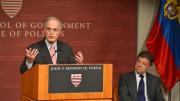Jorge Domínguez, formerly Madero professor for the study of Mexico and Harvard’s first vice provost for international affairs, who last year was publicly accused of persistent sexual harassment, will lose his emeritus status and the privileges associated with it, Faculty of Arts and Sciences (FAS) dean Claudine Gay announced in an email to members of the FAS community today. The University’s Title IX investigation into the case, she wrote, conducted by the Office for Dispute Resolution (ODR), has found that Domínguez “engaged in unwelcome sexual conduct toward several individuals, on multiple occasions over a period spanning nearly four decades.” Under the sanctions imposed by Gay, Domínguez will also be disinvited from the FAS campus, and from all FAS-sponsored activities on and off campus. At her request, the University has also disinvited him from the Harvard campus and Harvard-sponsored events.
The case represents the first time in recent memory that the University has revoked a professor’s emeritus status. The sanctions mean that Domínguez will be effectively barred from campus, and won’t be allowed to teach classes, have research assistants, access Harvard’s libraries, or have office space and other privileges provided to emeritus professors.
“The ODR findings reveal a longstanding pattern of behavior that, at several points, violated policies designed to ensure a safe and non-discriminatory educational and work environment,” Gay wrote. “I am appalled by the Report’s findings and heartbroken for those who had to endure the behaviors described.”
“In Title IX matters, there is always a tension between the privacy of the impacted parties and the needs of the broader community,” she continued. “With this investigation now concluded, I share the findings and sanctions in this specific case, because I believe that doing so is vital for the safety and well-being of our students, faculty, and staff. Following our policies and procedures has resulted in a set of sanctions that, in effect, removes Jorge Domínguez from our community. This has, in turn, created an obligation for our community to be informed of the removal.” Read her full announcement here.
In March 2018, after the Chronicle of Higher Education published stories detailing accusations that Domínguez had sexually harassed 18 women during his career at Harvard, he announced his retirement from the government department. Then-dean of FAS Michael D. Smith announced that the University would conduct an investigation into the allegations and that Domínguez would remain on administrative leave.
Last month, a government department committee responsible for evaluating the department’s culture released a final report describing the University’s “prolonged institutional failure” to address sexual misconduct, including the assertions that “Generations of students warned one another about Domínguez’s behavior and developed coping strategies for interactions with him (e.g., wearing heavy clothing, avoiding late afternoon meetings). Some students changed the focus of their research—at great cost—in order to avoid such interactions.” The report called for an external review of “why mechanisms of oversight broke down and how department/university culture and institutional practices may have permitted harassment to take place”; reforming the department’s process for reporting sexual harassment, such as adopting anonymous reporting; and better recruitment and retention of women faculty.
Government department graduate students had signed a letter soon after the Chronicle stories about Domínguez were published calling for, among other steps, an independent review of the department. In March 2018, 15 women who had accused Domínguez of sexual harassment called for the University to appoint an independent commission “to investigate what conditions gave rise to this situation and what can be done to prevent this from happening again.” During the investigation, President Lawrence Bacow had said that an external review could only take place after the University’s own investigation ended.
Now that the University’s investigation has concluded, Bacow wrote, in an email responding to the government department climate committee’s final report, that he will initiate an external review of how Harvard’s institutional culture may have prevented people who experience sexual harassment from reporting it, and whether there are barriers to effectively responding misconduct. It will also examine how faculty promotion decisions can be made with due consideration of reports or allegations of misconduct.









